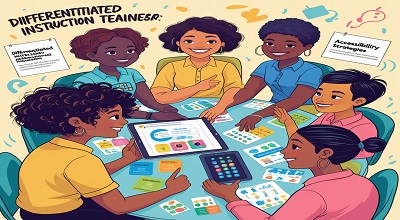Special Education Teacher Training
Special Education Teacher Training: Special education teacher training is a specialized program designed to equip educators with the skills and knowledge needed to support students with disabilities. These programs focus on inclusive teaching strategies, individualized education plans (IEPs), behavioral management, and assistive technologies.
With the increasing demand for inclusive education, well-trained special education teachers play a crucial role in ensuring that students with diverse learning needs receive quality education. This blog explores the latest trends, examples, and best practices in special education teacher training.
Why Special Education Teacher Training is Essential?
Meeting Diverse Learning Needs
Students with disabilities require tailored teaching approaches. Special education training helps teachers adapt lessons to meet individual needs, ensuring no child is left behind.
Legal and Ethical Responsibilities
Teachers must comply with laws like the Individuals with Disabilities Education Act (IDEA) and Section 504 of the Rehabilitation Act. Training ensures educators understand legal obligations.
Improving Classroom Management
Special education training provides strategies for managing behavioral challenges, fostering a positive learning environment.
Enhancing Communication Skills
Teachers learn how to effectively communicate with students, parents, and specialists to support student success.
Key Components of Special Education Teacher Training
Understanding Disabilities
Training covers various disabilities, including:
- Autism Spectrum Disorder (ASD)
- Attention Deficit Hyperactivity Disorder (ADHD)
- Dyslexia
- Intellectual Disabilities
- Physical and Sensory Impairments
Individualized Education Programs (IEPs)
Teachers learn to develop, implement, and monitor IEPs tailored to each student’s needs.
Behavioral Intervention Strategies
Training includes Positive Behavior Support (PBS) and Applied Behavior Analysis (ABA) techniques.
Assistive Technology
Educators explore tools like speech-to-text software, screen readers, and adaptive devices.
Collaborative Teaching Models
Co-teaching and teamwork with general education teachers are emphasized for inclusive classrooms.
Latest Trends in Special Education Training
Online and Hybrid Training Programs
Many institutions now offer flexible online courses for aspiring special education teachers.
Trauma-Informed Teaching
Training now includes strategies to support students with trauma-related challenges.
Social-Emotional Learning (SEL)
Programs integrate SEL to help students develop emotional regulation and interpersonal skills.
Universal Design for Learning (UDL)
UDL frameworks ensure lessons are accessible to all learners.
AI and EdTech in Special Education
Artificial intelligence tools personalize learning experiences for students with disabilities.
Examples of Special Education Teacher Training Programs
University-Based Programs
- Harvard Graduate School of Education – Offers a specialization in special education.
- University of Kansas – Renowned for its online special education certification.
Online Certification Courses
- Council for Exceptional Children (CEC) – Provides accredited professional development.
- Teach.com – Offers specialized training in autism and behavioral interventions.
Government-Funded Initiatives
- IDEA Part B Grants – Supports training for special educators in public schools.
- Project Reach – A federally funded program for teacher upskilling.
School District Training Programs
Many school districts provide in-house training on IEP development and classroom adaptations.
Challenges in Special Education Teacher Training
Shortage of Qualified Trainers
Many regions lack experienced instructors for specialized training.
High Burnout Rates
Stressful work conditions lead to teacher attrition.
Limited Funding for Training Programs
Schools often struggle to allocate budgets for professional development.
Keeping Up with Technological Advances
Teachers must continuously update their skills with new EdTech tools.
How to Choose the Right Special Education Training Program?
Accreditation and Certification
Ensure the program is recognized by CEC or state education boards.
Hands-On Experience
Look for programs offering practicums or student-teaching opportunities.
Flexibility and Accessibility
Online or hybrid programs are ideal for working professionals.
Specialization Options
Choose programs focusing on specific disabilities (e.g., autism, dyslexia).
Alumni Success and Reviews
Research feedback from past participants.
FAQs on Special Education Teacher Training
Q1. What qualifications do I need to become a special education teacher?
Most states require a bachelor’s degree in special education and a teaching license.
Q2. How long does special education training take?
Certification programs typically take 1-2 years, while master’s degrees require 2-3 years.
Q3. Can I complete special education training online?
Yes, many accredited institutions offer online programs.
Q4. What is the average salary for a special education teacher?
In the U.S., the average salary ranges from 50,000 to 70,000 annually.
Q5. Are there scholarships for special education training?
Yes, organizations like CEC and IDEA offer financial aid.
Conclusion
Special education teacher training is vital for creating inclusive and supportive learning environments. With evolving teaching strategies and technological advancements, educators must stay updated through continuous professional development. Whether through university programs, online courses, or district-led initiatives, quality training ensures that teachers are well-equipped to meet the needs of all students.
Read Now: Naughty Girl Makeup Salon APK
